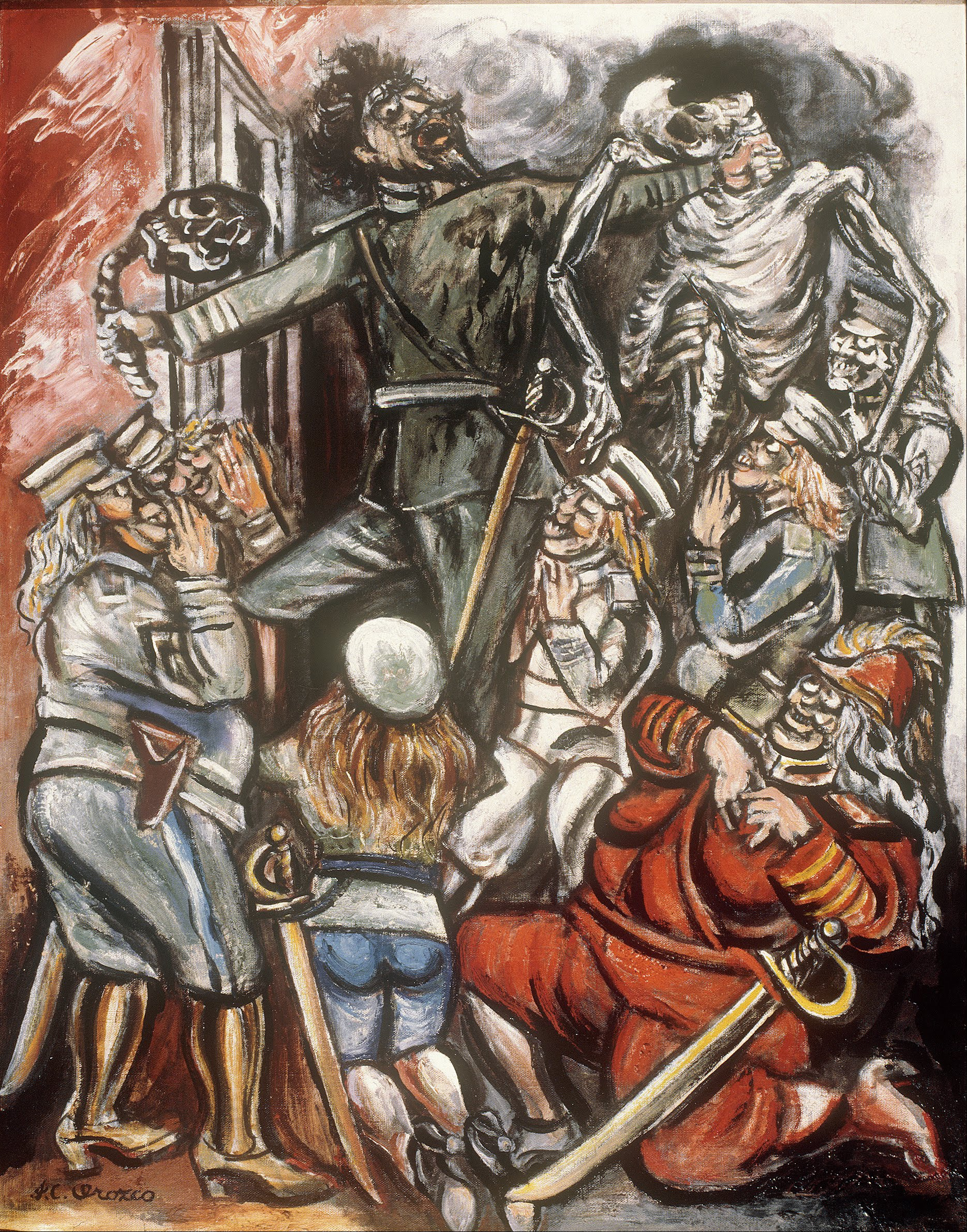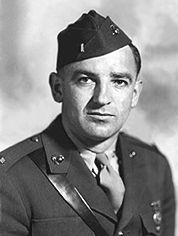|
Demagogue
A demagogue (from Greek , a popular leader, a leader of a mob, from , people, populace, the commons + leading, leader) or rabble-rouser is a political leader in a democracy who gains popularity by arousing the common people against elites, especially through oratory that whips up the passions of crowds, appealing to emotion by scapegoating out-groups, exaggerating dangers to stoke fears, lying for emotional effect, or other rhetoric that tends to drown out reasoned deliberation and encourage fanatical popularity. Demagogues overturn established norms of political conduct, or promise or threaten to do so. Historian Reinhard Luthin defined ''demagogue'' as "...a politician skilled in oratory, flattery and invective; evasive in discussing vital issues; promising everything to everybody; appealing to the passions rather than the reason of the public; and arousing racial, religious, and class prejudices – a man whose lust for power without recourse to principle leads him to see ... [...More Info...] [...Related Items...] OR: [Wikipedia] [Google] [Baidu] |
Demagogue
A demagogue (from Greek , a popular leader, a leader of a mob, from , people, populace, the commons + leading, leader) or rabble-rouser is a political leader in a democracy who gains popularity by arousing the common people against elites, especially through oratory that whips up the passions of crowds, appealing to emotion by scapegoating out-groups, exaggerating dangers to stoke fears, lying for emotional effect, or other rhetoric that tends to drown out reasoned deliberation and encourage fanatical popularity. Demagogues overturn established norms of political conduct, or promise or threaten to do so. Historian Reinhard Luthin defined ''demagogue'' as "...a politician skilled in oratory, flattery and invective; evasive in discussing vital issues; promising everything to everybody; appealing to the passions rather than the reason of the public; and arousing racial, religious, and class prejudices – a man whose lust for power without recourse to principle leads him to see ... [...More Info...] [...Related Items...] OR: [Wikipedia] [Google] [Baidu] |
Reinhard Luthin
Reinhard Henry Luthin (January 26, 1905 – November 24, 1962) was a historian best known for his contribution to the history of President Abraham Lincoln. He was a noted professor of history at Columbia University, with a lifelong interest in facts regarding Lincoln's life and times. Life and career He was born on January 26, 1905 in Manhattan, New York City. Dr. Luthin, a Fulbright Scholar, graduated from Columbia University with honors in History in June 1934. Later he received his doctoral degree from Columbia University where he co-authored ''Lincoln and the Patronage'' with the Dean of Columbia University (1943–1950), Harry Carman. ''New York Times'' writer, Theodore Mack, was quoted as saying "the conclusion of the authors at the end of this enlightening and scholarly work does credit to the time and energy that must have gone into it." As a Fulbright Scholar, he studied and taught as a Professor of American and European history at the University of Decca, Pakistan, ... [...More Info...] [...Related Items...] OR: [Wikipedia] [Google] [Baidu] |
Joseph McCarthy
Joseph Raymond McCarthy (November 14, 1908 – May 2, 1957) was an American politician who served as a Republican U.S. Senator from the state of Wisconsin from 1947 until his death in 1957. Beginning in 1950, McCarthy became the most visible public face of a period in the United States in which Cold War tensions fueled fears of widespread communist subversion. He is known for alleging that numerous communists and Soviet spies and sympathizers had infiltrated the United States federal government, universities, film industry, and elsewhere. Ultimately, he was censured for refusing to cooperate with, and abusing members of, the committee established to investigate whether or not he should be censured. The term "McCarthyism", coined in 1950 in reference to McCarthy's practices, was soon applied to similar anti-communist activities. Today, the term is used more broadly to mean demagogic, reckless, and unsubstantiated accusations, as well as public attacks on the character or p ... [...More Info...] [...Related Items...] OR: [Wikipedia] [Google] [Baidu] |
Huey Long
Huey Pierce Long Jr. (August 30, 1893September 10, 1935), nicknamed "the Kingfish", was an American politician who served as the 40th governor of Louisiana from 1928 to 1932 and as a United States senator from 1932 until his assassination in 1935. He was a left-wing populist member of the Democratic Party and rose to national prominence during the Great Depression for his vocal criticism of President Franklin D. Roosevelt and his New Deal, which Long deemed insufficiently radical. As the political leader of Louisiana, he commanded wide networks of supporters and often took forceful action. A controversial figure, Long is celebrated as a populist champion of the poor or, conversely, denounced as a fascistic demagogue. Long was born in the impoverished north of Louisiana in 1893. After working as a traveling salesman and briefly attending three colleges, he was admitted to the bar in Louisiana. Following a short career as an attorney, in which he frequently represented ... [...More Info...] [...Related Items...] OR: [Wikipedia] [Google] [Baidu] |
Father Coughlin
Charles Edward Coughlin ( ; October 25, 1891 – October 27, 1979), commonly known as Father Coughlin, was a Canadian-American Catholic priest based in the United States near Detroit. He was the founding priest of the National Shrine of the Little Flower. Dubbed "The Radio Priest", he was one of the first political leaders to use radio to reach a mass audience. During the 1930s, when the U.S. population was about 120 million, an estimated 30 million listeners tuned to his weekly broadcasts. Coughlin was born in Canada to working-class Irish Catholic parents. He was ordained to the priesthood in 1916, and in 1923 he was assigned to the National Shrine of the Little Flower in Royal Oak, Michigan. Coughlin began broadcasting his sermons during a time of increasing anti-Catholic sentiment across the globe. As his broadcasts became more political, he became increasingly popular. Initially, Coughlin was a vocal supporter of Franklin D. Roosevelt and his New Deal, but he became a h ... [...More Info...] [...Related Items...] OR: [Wikipedia] [Google] [Baidu] |
Common People
A commoner, also known as the ''common man'', ''commoners'', the ''common people'' or the ''masses'', was in earlier use an ordinary person in a community or nation who did not have any significant social status, especially a member of neither royalty, nobility, nor any part of the aristocracy. Depending on culture and period, other elevated persons (such members of clergy) may have had higher social status in their own right, or were regarded as commoners if lacking an aristocratic background. This class overlaps with the legal class of people who have a property interest in common land, a longstanding feature of land law in England and Wales. Commoners who have rights for a particular common are typically neighbors, not the public in general. History Various states throughout history have governed, or claimed to govern, in the name of ''the common people''. In Europe, a distinct concept analogous to ''common people'' arose in the Classical civilization of ancient Rome aro ... [...More Info...] [...Related Items...] OR: [Wikipedia] [Google] [Baidu] |
Scapegoating
Scapegoating is the practice of singling out a person or group for unmerited blame and consequent negative treatment. Scapegoating may be conducted by individuals against individuals (e.g. "he did it, not me!"), individuals against groups (e.g., "I couldn't see anything because of all the tall people"), groups against individuals (e.g., "He was the reason our team didn't win"), and groups against groups. A scapegoat may be an adult, child, sibling, employee, peer, ethnic, political or religious group, or country. A whipping boy, identified patient, or "fall guy" are forms of scapegoat. At the individual level A medical definition of scapegoating is: Scapegoated groups throughout history have included almost every imaginable group of people: genders, religions, people of different races, nations, or sexual orientations, people with different political beliefs, or people differing in behaviour from the majority. However, scapegoating may also be applied to organizations, such a ... [...More Info...] [...Related Items...] OR: [Wikipedia] [Google] [Baidu] |
Polybius
Polybius (; grc-gre, Πολύβιος, ; ) was a Greek historian of the Hellenistic period. He is noted for his work , which covered the period of 264–146 BC and the Punic Wars in detail. Polybius is important for his analysis of the mixed constitution or the separation of powers in government, his in-depth discussion of checks and balances to limit power, and his introduction of "the people", which influenced Montesquieu's ''The Spirit of the Laws'', John Locke's ''Two Treatises of Government'', and the framers of the United States Constitution. The leading expert on Polybius for nearly a century was F. W. Walbank (1909–2008), who published studies related to him for 50 years, including a long commentary of his ''Histories'' and a biography. Early life Polybius was born around 200 BC in Megalopolis, Greece, Megalopolis, Arcadia (region), Arcadia, when it was an active member of the Achaean League. The town was revived, along with other Achaean states, a century before he ... [...More Info...] [...Related Items...] OR: [Wikipedia] [Google] [Baidu] |
Ivo Mosley
Ivo Adam Rex Mosley (born 1951) is a British writer. His career has encompassed ceramics, poetry, social commentary, opera and musical theatre. His focus of the last few years is on works of non-fiction relating to politics and monetary reform. Early life, family and education Born in London in 1951, the son of writer Nicholas Mosley, and grandson of politician Oswald Mosley, Ivo Mosley went to Bryanston School before studying Japanese at New College, Oxford. In 2007 he also completed an MA in musical theatre at Goldsmiths College, London. In 1977 he married the artist Xanthe Oppenheimer. Ceramics Whilst studying, Mosley became fascinated by Japanese pottery and porcelain. On completing his degree in 1972, he purchased a kiln and started making pots. Based in London, this was his career until 1987, and he became known for his bold use of colour and the development of new glazing techniques. Not unlike other Oxbridge educated ceramicists such as Edmund de Waal, Mosley comb ... [...More Info...] [...Related Items...] OR: [Wikipedia] [Google] [Baidu] |
José Clemente Orozco - The Demagogue - Google Art Project
José is a predominantly Spanish and Portuguese form of the given name Joseph. While spelled alike, this name is pronounced differently in each language: Spanish ; Portuguese (or ). In French, the name ''José'', pronounced , is an old vernacular form of Joseph, which is also in current usage as a given name. José is also commonly used as part of masculine name composites, such as José Manuel, José Maria or Antonio José, and also in female name composites like Maria José or Marie-José. The feminine written form is ''Josée'' as in French. In Netherlandic Dutch, however, ''José'' is a feminine given name and is pronounced ; it may occur as part of name composites like Marie-José or as a feminine first name in its own right; it can also be short for the name ''Josina'' and even a Dutch hypocorism of the name ''Johanna''. In England, Jose is originally a Romano-Celtic surname, and people with this family name can usually be found in, or traced to, the English county of ... [...More Info...] [...Related Items...] OR: [Wikipedia] [Google] [Baidu] |
Ingroups And Outgroups
In sociology and social psychology, an in-group is a social group to which a person psychologically identifies as being a member. By contrast, an out-group is a social group with which an individual does not identify. People may for example identify with their peer group, family, community, sports team, political party, gender, sexual orientation, religion, or nation. It has been found that the psychological membership of social groups and categories is associated with a wide variety of phenomena. The terminology was made popular by Henri Tajfel and colleagues beginning in the 1970s during his work in formulating social identity theory. The significance of in-group and out-group categorization was identified using a method called the minimal group paradigm. Tajfel and colleagues found that people can form self-preferencing in-groups within a matter of minutes and that such groups can form even on the basis of completely arbitrary and invented discriminatory characteristics, such ... [...More Info...] [...Related Items...] OR: [Wikipedia] [Google] [Baidu] |
Racism
Racism is the belief that groups of humans possess different behavioral traits corresponding to inherited attributes and can be divided based on the superiority of one race over another. It may also mean prejudice, discrimination, or antagonism directed against other people because they are of a different race or ethnicity. Modern variants of racism are often based in social perceptions of biological differences between peoples. These views can take the form of social actions, practices or beliefs, or political systems in which different races are ranked as inherently superior or inferior to each other, based on presumed shared inheritable traits, abilities, or qualities. There have been attempts to legitimize racist beliefs through scientific means, such as scientific racism, which have been overwhelmingly shown to be unfounded. In terms of political systems (e.g. apartheid) that support the expression of prejudice or aversion in discriminatory practices or laws, racist ideology ... [...More Info...] [...Related Items...] OR: [Wikipedia] [Google] [Baidu] |







